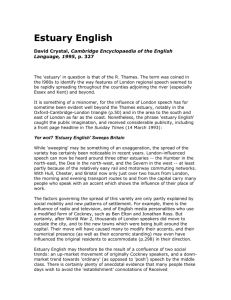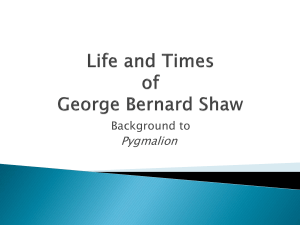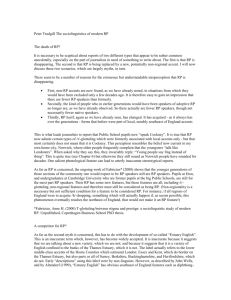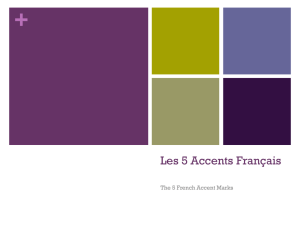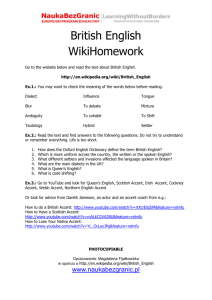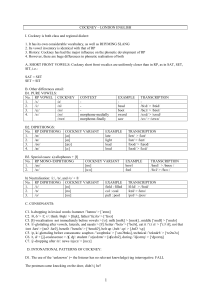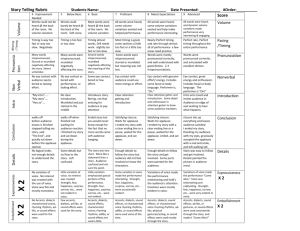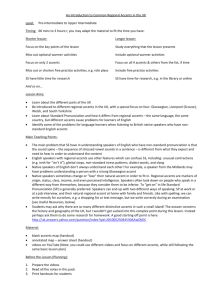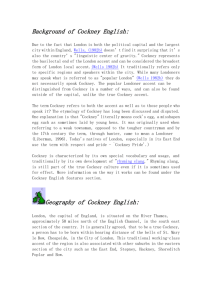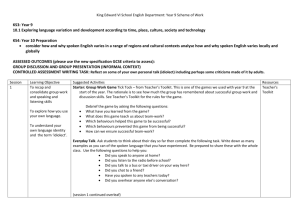presentation
advertisement
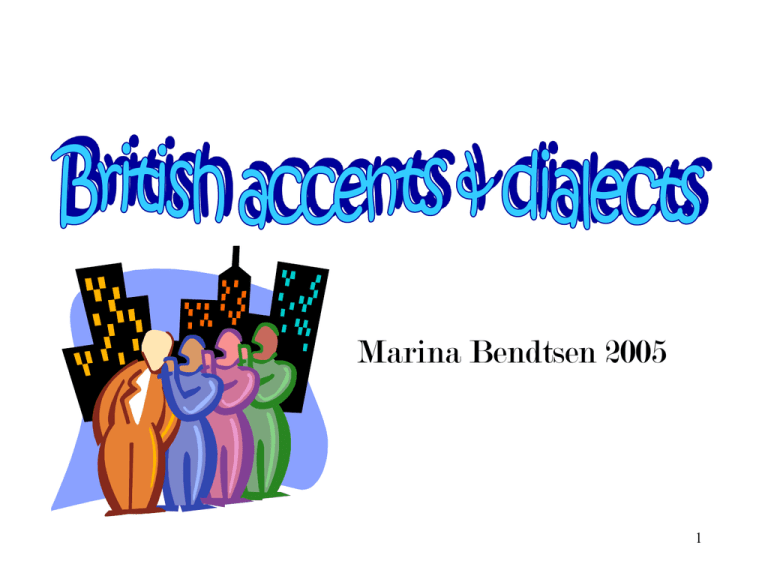
Marina Bendtsen 2005 1 This presentation comprises five separate tasks. You are to write the answers on a piece of paper to be handed in to the teacher for feedback. Index: page 3: introduction page 4: map of dialects and accents of the British Isles page 5: task 1 page 6: task 2 page 7: task 3 page 8: task 4 page 9: task 5 page 10: links to websites Next page 2 Dialects and accents of the British Isles The English of Great Britain shows great variation when it comes to pronunciation.There are many different dialects as illustrated on p.4. The dialects can be divided into five dialect areas: Northern English, Southern English (eg.Cockney, Estuary English), Wales, Scotland & Northern Ireland and Southern Ireland (Svartvik 1999). These can, in turn, be divided into several sub-regions. This presentation does not give a comprehensive coverage of the dialects and accents of the British Isles but is intended to give a taste of the variation of the English language spoken within the UK. The presentation includes the following sound samples: North England, East Anglia (rural), Cockney, Estuary English, Wales, Scotland and Northern Ireland. On top of this there is also an American (!) sample from Brooklyn (New York City). back to index page Next page 3 Next page Back to Estuary E. Back to introduction 4 TASK 1. Listen to the following samples of dialects and accents. Your task is to decide which one is Cockney. A short description of the Cockney accent can be found on page 6. a e b f c g d Back to indexpage Next page 5 TASK 2. Listen to the Cockney sample on page 5 again. As you listen, try to find examples of each of the five distinguishing features of Cockney that you find here below. Write down the words and underline the part where the sound occurs. RP Cockney /ei/ /ai/ rain, Spain // /f/ think // /v/ bother /t/ /k/ /ף/ glottal stop initial /h/ /-/ Back to indexpage Back to page 5 butter, football house, hot Next page 6 TASK 3. Listen and find the matching sound samples to the three dialects illustrated on this page. Note that there is one extra sound sample! Scottish English Northern Ireland * ‘r’ pronounced in all positions * the speech is quite similar to that of Scotland * ‘wh’ pronounced /hw/ eg. what, when * r’ pronounced in all positions * usually no distinction between vowel sounds in * ‘wh’ pronounced /hw/ eg. what, when pull- pool, Sam-psalm, cot-caught (all short) * look and Luke are homophonous giving a distinctive ‘clipped’ pronunciation * “pure” vowels eg. boat bo:t , cane ke:n * RP /ou/ /ei/ / ס/ /e/ eg. coat, face * RP /ɜ:/ /ir/ eg. bird, firm * /aʊ/ is pronounced /əū/, eg. ’house’ /haus/ /høus/ Welsh English * the intonation of Welsh English is influenced by the Welsh language giving it a ”sing-song” effect a b c d * RP /ou/ a more narrow /o:/ in words such as code, toe * RP/æ/ /a/ in words such as pat, fat Back to indexpage Next page 7 TASK 4. Below is a sample of an accent spoken in the north of England . Give as many examples as you can of each feature illustrated below. RP English North /Λ/ /ʊ/ love, dozen /æ/ /a/ ham, mad, sad English north Back to indexpage Next page 8 TASK 5. Estuary English A relatively new variety of English that could be described as a mixture between RP and Cockney. The accent is spoken mainly in the southeast of England (originally around the Thames estuary, cf. map p.4 ). Some people claim that Estuary English is due to replace RP as the educated accent of England. Listen to the following text read by a speaker of Estuary English (adapted version, cf. www.lowlands-l.net/anniversary/index.php?page=estuary). Give a few examples of how the accent differs from RP. The Wren Once upon a time a wren family had their nest in a garage. One day the parents flew off to get something to eat for the kids, leaving the sprogs on their own. After a while the father wren came back home. -”What’s up?” , he asks.” Has someone had a go at you , kids? You look terrified!” -”Oh, dad”, they say. ”There was a big scary man here just now. He was really fierce and horrible. He stared into our nest with his big eyes. We were well scared.” -”Right”, says father wren, ”which way did he go”? -”He went down that way”, they answer. -”Wait here”, says father wren.” I’ll go after him. Don’t worry now kids. I’ll get him”. And with that he flew off after him. Back to Next page 9 indexpage Websites for further information on varieties and accents of English: http://berieke.tripod.com/id1.html (Informal presentation of some typical British accents. Including an excerpt from Harry Potter in different accents!) The British Library sound archive: http://www.bl.uk/collections/soundarchive/nsa.html The Language Varieties Web Site: http://www.une.edu.au/langnet/ (listen to different varieties of English) English around the world: http://eleaston.com/world-eng.html#dialect (including sound samples of eg. Elisabethan English etc.) English Dialects and Regional variants: http://dir.yahoo.com/Social_Science/Linguistics_and_Human_Languages/Lang uages/Specific_Languages/English/Dialects_and_Regional_Variants/ The speech accent archive: http://accent.gmu.edu/about.php#credits (listen to different languages and accents of the world) English accents: links to additional materials http://www.let.uu.nl/~Rene.Kager/personal/TV2/accents.htm back to indexpage 10
